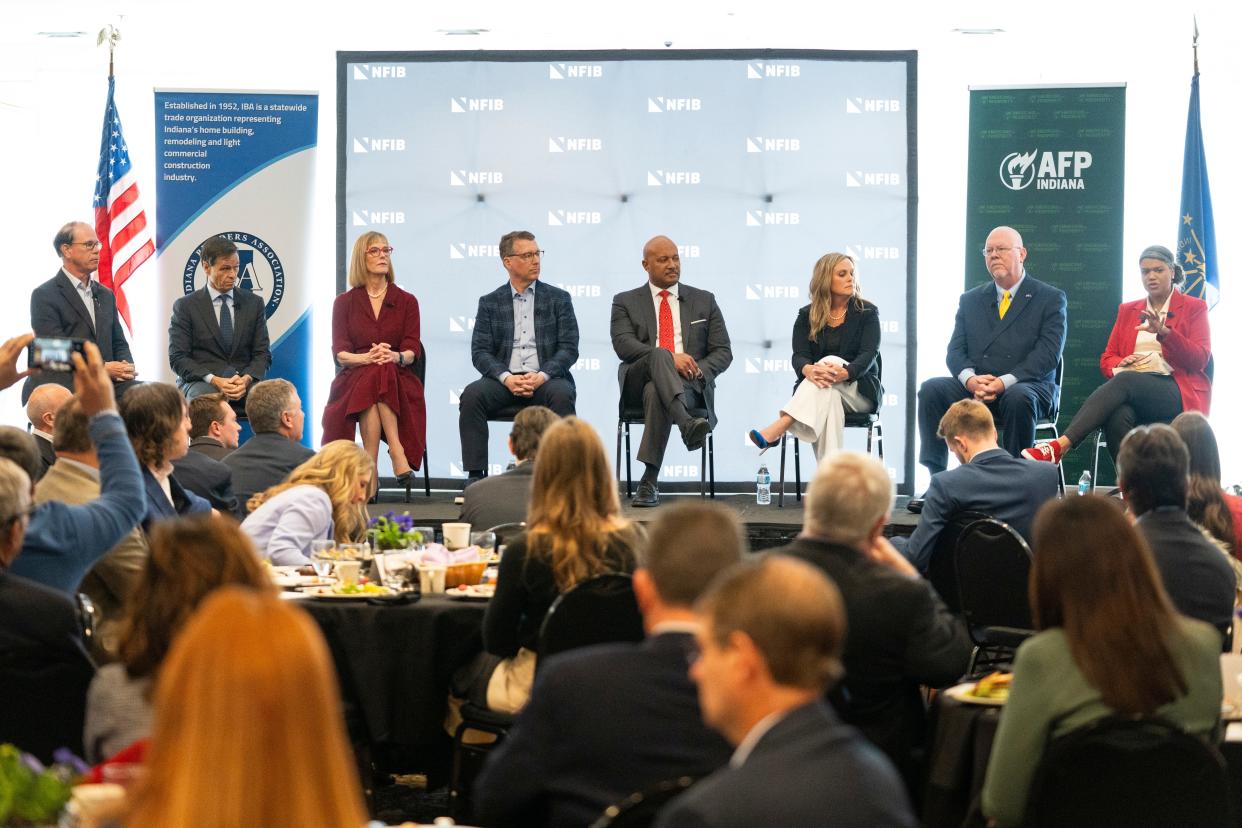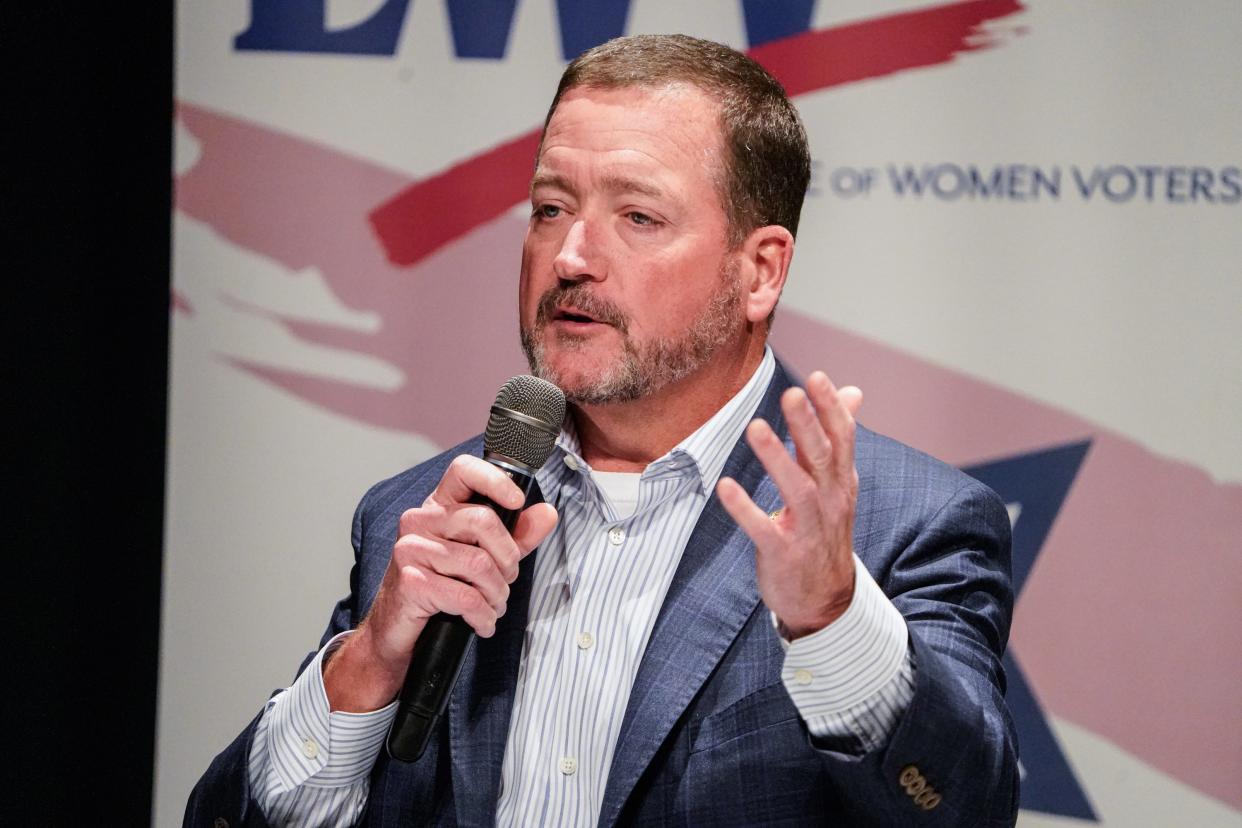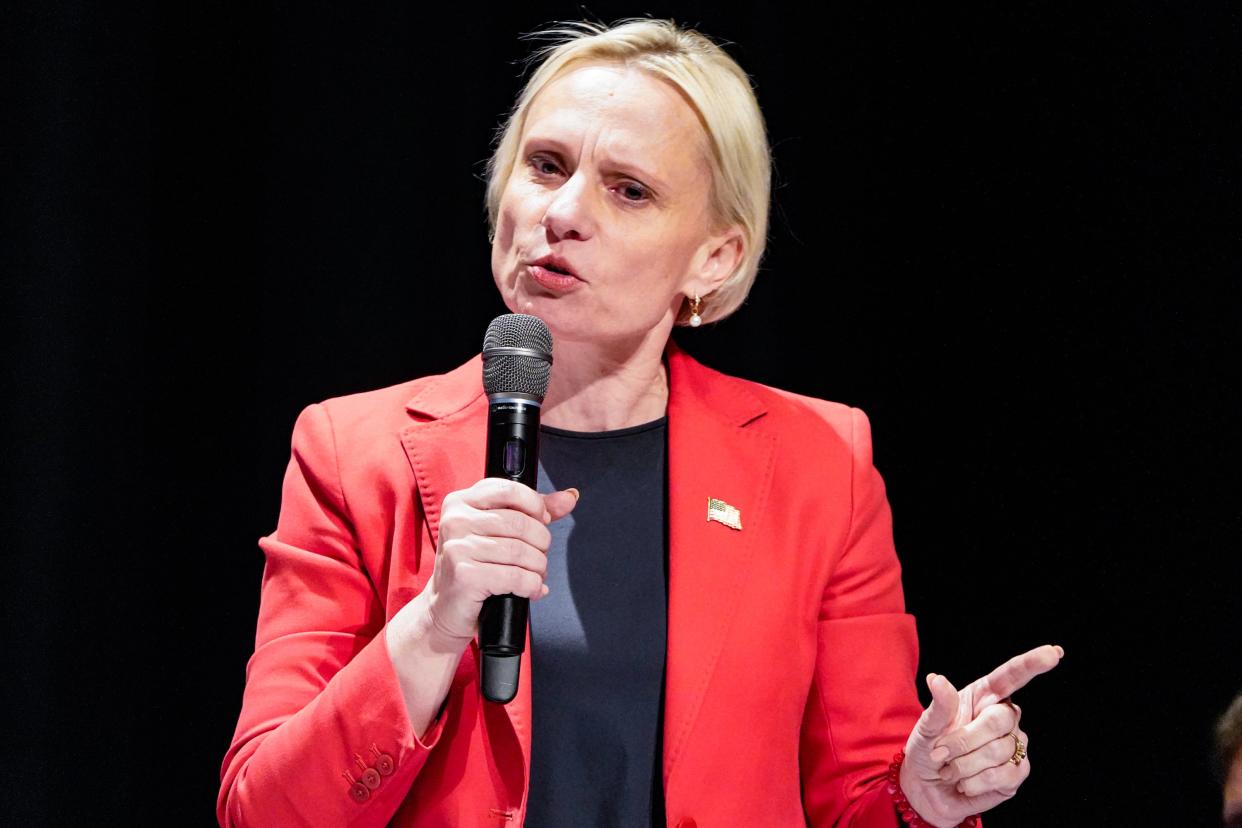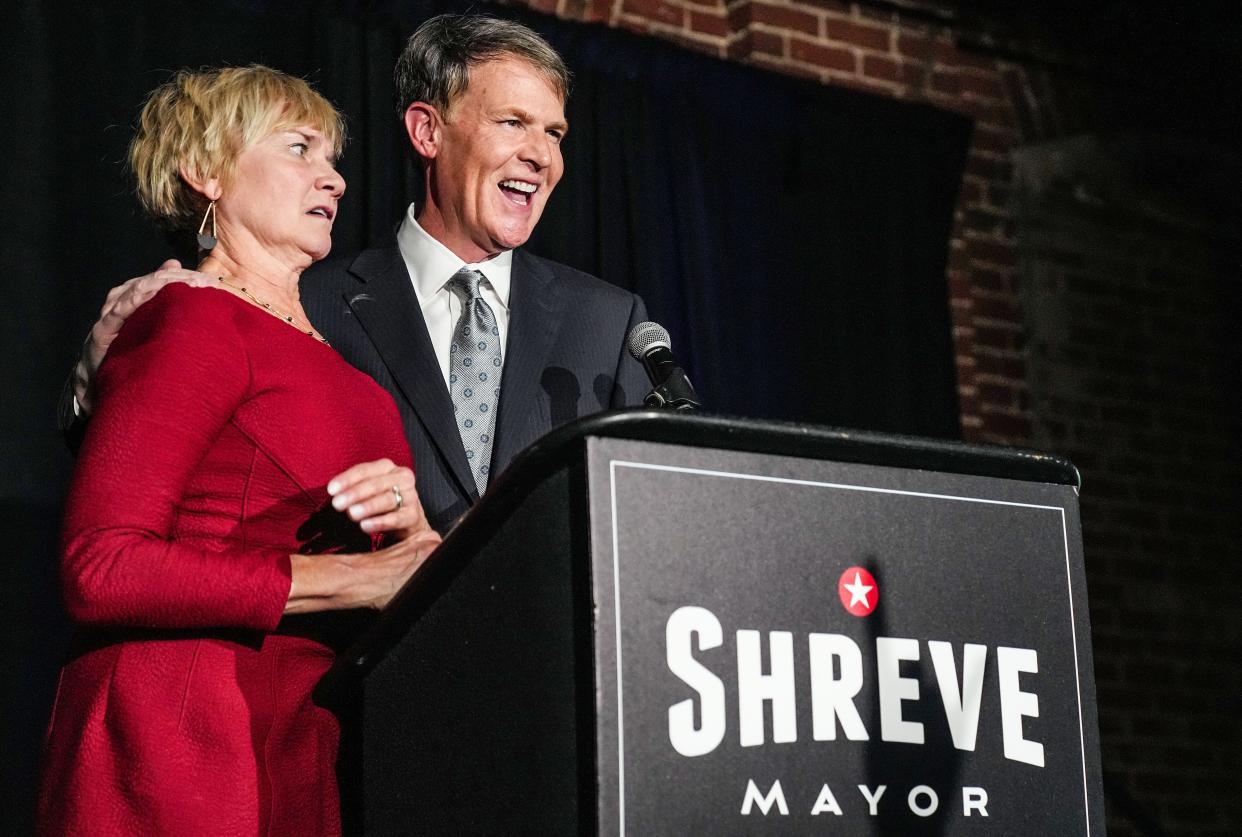'Wealthy person's game': Self-funders drive up the cost to win Indiana elections
In 1996, the last time there was real competition in an Indiana Republican gubernatorial primary, the late state GOP chair Rex Early made a comment to an Indianapolis Star reporter that would prove prophetic.
"It's a damn shame that in this race we're going to have to spend over $7 million," Early, who was running against Indianapolis mayor Stephen Goldsmith for the Republican nomination, said in the March 24, 1996, edition. "It sure limits your choice of who can be governor."
Nearly 30 years later, the heads of campaign managers everywhere are spinning.
Newspapers called that 1996 primary, also held on May 7, the "most expensive" in Indiana history. But big money has only tightened its grip on politics since then: This year's Republican gubernatorial primary eclipses Indiana gubernatorial primary spending records by multitudes, and multiple wealthy candidates are self-funding their campaigns, both for governor and for Congress, to the tune of millions.

For better or worse, money has become a defining feature of this election cycle. Self-funders, in particular, have risen to prominence in Indiana ― a national trend that has surged dramatically in the last two decades.
In Indiana, congressional candidates in particular have relied more on personal wealth than their peers elsewhere, according to an analysis of candidates who reported contributing at least $1 million this election cycle by Open Secrets, a nonpartisan group that tracks money in politics.
Four Indiana candidates ranked in the top 10 in terms of what percentage of their bottom line is self-funded.
So while Early may not have foreseen a 2024 gubernatorial primary where a whopping six candidates will appear on the ballot, his statement remains prescient: The big money game has only gotten bigger, and those who can't raise or spend millions get left behind.
"It sends a message that politics is a wealthy person’s game," said Marina Pino, who serves as counsel in the elections and government program at the Brennan Center for Justice. "This is part of an ecosystem of unlimited big money that we find ourselves in, and at bottom, this has significant implications for goals of achieving a more representative government."
The numbers: This gubernatorial primary dwarfs others
The magnitude of this Republican primary's expense can't be overstated.
Since the 1996 race, Republican primaries just haven't been competitive until this year ― each election there has been one prominent candidate with all the party backing and all the money. And for the most part, they saved up their money for the real competition: the general election.
This election cycle, from Fort Wayne entrepreneur Eric Doden's entry in 2021 through the end of the first quarter of 2024, the six Republican candidates ― which also include U.S. Sen. Mike Braun, Lt. Gov. Suzanne Crouch, former commerce Secretary Brad Chambers, former Attorney General Curtis Hill and Indianapolis mother Jamie Reitenour ― have raised more than $42 million and spent nearly $36 million.
[infogram id="4220a848-6f91-40dd-9caf-559f954162fe" prefix="3sS" format="interactive" title="Indiana 2024 governor's race spending"]
Chambers came out the first quarter on top in terms of spending: He's spent more than $12 million; Doden nearly $10 million and Braun more than $9 million.
The last Republican primary with multiple candidates qualifying for the ballot was in 2004, when Mitch Daniels handily defeated conservative activist Eric Miller. David McIntosh, a gubernatorial candidate in 2000, also ran, but dropped out before the filing deadline. Altogether, the three raised nearly $8 million that election cycle and spent about $5 million.
[infogram id="ec488bf9-100f-4478-a806-7fb66f70fbe7" prefix="QuY" format="interactive" title="Indiana governor primaries, 2004-2024"]
The last gubernatorial election where candidates collectively spent more than $40 million was the general election in 2016. It was going to be a rematch between Republican Mike Pence and John Gregg, a pro-Second Amendment Democrat who lost to Pence by a razor-thin margin in 2012. But after Pence won the Republican primary nomination in 2016, he was tapped to be former President Donald Trump's vice president. Convention delegates selected Eric Holcomb to be the replacement nominee. Gregg, spending $16 million by the end of the election cycle, had out-spent both of them, but lost narrowly to Holcomb's 51.4% of the vote.
The winds have shifted since the Trump era. There's less and less room in today's Democratic party for the kind of Gregg-esque, socially conservative candidate who could stand a chance in deep-red Indiana. This year's Democratic presumptive nominee, Jennifer McCormick, has raised a little over half a million dollars thus far ― not nearly the kind of financial backing political observers believe a Democratic nominee would need to have a fair shake.
So the real competition for governor, this time, is in the primary.
The season for self-funders
Several of Indiana's primary races, including the governor's race, break molds in a different way: Some of their biggest spenders are also significantly self-funding their endeavors.
To date, Chambers has loaned his gubernatorial campaign $10 million of the roughly $13 million he's raised. Doden gave $200,000 to his campaign, and his family members chipped in $4,875,000 in both loans and direct contributions. And Republican candidates in the 5th and 6th Congressional District primaries have funneled millions of dollars to their own campaigns, far exceeding the self-funding amounts of individual candidates in the last competitive primary races for those districts.
In some ways this is part of a national trend. From 2002 to 2022, the amount of self-funding in congressional races ― the total dollar figure across all races ― has quadrupled. The U.S. Supreme Court has repeatedly protected candidates' unlimited ability to lend or donate to themselves.
But there have also been some local circumstances that explain the stakes: an unusual situation with incumbent Republican U.S. Rep. Victoria Spartz’s return to the race in the 5th District and an open seat in the 6th with the retirement of Republican U.S. Rep. Greg Pence.
In the 5th District, Gaylor Electric CEO and state Rep. Chuck Goodrich has loaned $4.6 million to his campaign since March 2023 with more than 75% of that self-funding coming after Spartz filed for reelection in early February, according to federal election reports. That district stretches from Hamilton County north to Grant County.

Spartz in 2023 publicly announced that she would not run for reelection to the 5th District, but reversed that decision in February after eight other candidates, including Goodrich, had been campaigning and fundraising for months.
With Spartz's late entry into the race, contributing Goodrich's own money was likely a quicker way to attempt to compete with Spartz's name recognition than doing a 11th hour fundraising blitz.
The 2020 primary for the 5th Congressional District featured 15 Republican candidates, but federal campaign finance reports show nobody in that race self-funded their campaigns to the level that Goodrich has in 2024.
Spartz, who won that 2020 primary, was the only candidate to spend $1 million on her own campaign, which she paid back to herself in 2023. Former U.S. Rep. Susan Brooks, who won her election to the 5th District in 2012, 2014, 2016 and 2018, never self-funded her campaigns.

In 2024, Spartz has not yet given money to her reelection bid. There is a large fundraising gap between Spartz and Goodrich and her campaign has criticized the Noblesville state representative for trying to “buy” the election, including in a recent campaign email challenging the him to a debate.
“Crooked Chuck is spending millions of dollars to smear my conservative record with lies, so he can buy this election and get even richer in Congress,” Spartz said in the campaign email.
But Goodrich's campaign in a statement pointed to Spartz's loans in her 2020 run for the 5th District.
"The future of the country is at stake, and Chuck Goodrich is fighting the Washington Swamp special and foreign interests, which Victoria Spartz wholly embodies," the Goodrich campaign statement reads.
In the Republican primary for the 6th District, Storage Express founder Jefferson Shreve has loaned $4.5 million to his primary campaign and Indianapolis state Rep. Mike Speedy has funneled $1.3 million to his campaign. Richmond businessman Jamison Carrier also self-funded $750,000 to his campaign for the 6th District, which includes Marion County and stretches east to Indiana's border with Ohio.
Shreve, who lent and donated a total of $13.5 million to his unsuccessful Indianapolis mayoral bid in 2023, has almost entirely self-funded his 6th District campaign in the first three months of 2024, outside of one $500 donation in March. Shreve and Goodrich rank among the top of candidates running for federal office in self-funding, according to OpenSecrets, a nonpartisan group that tracks money in politics.
Shreve in a statement told IndyStar he has focused his campaign on meeting 6th District residents, not fundraising.
"I worked hard and have been lucky in business, so I'm spending my own money," Shreve said in the statement. "If the voters send me to Congress, I'll keep working hard -- to serve my constituents. I won't owe anything to special interests or lobbyists."

Among 2024 candidates for U.S. House races, only Gil Cisneros, a California Democrat, has contributed more of his own money to his campaign than Shreve this election cycle, according to OpenSecrets. In terms of the proportion of fundraising from the candidate's bank account verses outside contributions, Shreve tops the national list.
The last competitive primary for the 6th Congressional District was in 2018 when Pence was elected to the seat his younger brother previously held. In that primary, Pence did not give any of his own money to his campaign, but Jonathan Lamb, one of his opponents, loaned his own campaign $820,000.
In the 8th Congressional District, which is also an open seat this year, two candidates have loaned their campaigns $500,000 or more: Richard Moss and Dominick Kavanaugh.
While self-funders in 2024 congressional races have hit million-dollar high in loans to their campaigns, it’s not the first race where a candidate has been accused of “buying” a race.
In 2016, Republican Trey Hollingsworth moved to Indiana from Tennessee, skirted the state’s two-primary law with the approval of then-Clark County GOP chair Jamey Noel and ran for the 9th Congressional District. He drew nicknames like “carpetbagger” and “Tennessee Trey,” but won his election in 2016, 2018 and 2020.
Hollingsworth ahead of the primary in 2016 loaned more than $1 million to his campaign. His father also spent hundreds of thousands of dollars on a super political action committee that pumped out ads praising his son leading up to the primary.
The pros and cons of self-funding
Pumping personal wealth into a race can help a candidate leap forward in the polls with less effort. Big dollars buys exposure. And a candidate can claim, as Shreve has, that they "can't be bought" by special interests. But the reality is more complicated.
For one, self-funders rarely win. In 2022, only six of the 44 congressional candidates across the country who gave at least $1 million to their campaigns actually won their races, according to OpenSecrets.
But winning may not be the only goal, points out John Martin, Research Assistant Professor of Law at the University of Virginia.
"Self funding could help them buy influence in the larger political machine," he said.
Vivek Ramaswamy, for example, dropped his presidential bid but is now a nationally recognized name and has hitched onto the Trump campaign. (He's even headlining a GOP dinner in Hamilton County on Thursday.) At the local or state level, a self-funder can raise their profile among their local party.
Indiana governor's race: Many candidates, little time to grab voters' interest
Influence works the other way around, too: If the self-funder wins, a private donor could take the opportunity to curry favor by donating a large sum to help replenish their bank account.
"My view if this doesn’t raise corruption risk, I don't know what does," Martin said.
If the self-funder loses, third-party donors are nonetheless on the hook to help the campaign pay the candidate back.
The trend also tends to favor less diverse, and heavily male, participants in politics. Male self-funders outnumber female self-funders five to one, Pino, of the Brennan Center, said.
The upward spiral of campaign spending contrasts drastically with the wishes of everyday Americans. In a Pew Research Center poll last year, a vast majority of Americans across the political spectrum said they felt the cost of campaigning "makes it hard for good people to run for office," and most felt there should be limits on individual contributions.
"It just becomes a question of how these candidates are aligning themselves with the folks they’re seeking to represent," Pino said. "There’s definitely a gap there."
Chambers thinks of it less cynically. Most Hoosiers didn't know who he was, and so he invested his own money partly to ramp up his name-ID. And, he considers his contributions more like an "investment" in Indiana and a form of giving back.
"I think it's in that spirit. I mean, it's expensive. Who wants to do that? No one," he said. "It's a significant investment, but I believe in my ability to affect change and move Indiana into the future. And so it's worth that."
Contact IndyStar state government and politics reporter Kayla Dwyer at kdwyer@indystar.com or follow her on Twitter @kayla_dwyer17.
Contact IndyStar state government and politics reporter Brittany Carloni at brittany.carloni@indystar.com or 317-779-4468. Follow her on Twitter/X@CarloniBrittany.
This article originally appeared on Indianapolis Star: Self-funders drive up cost to win Indiana's primary election
